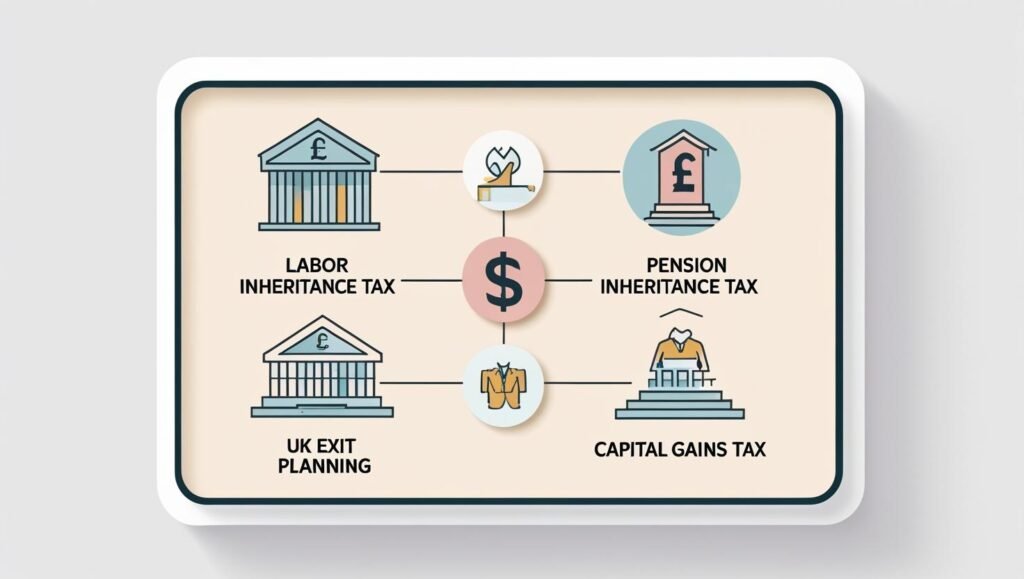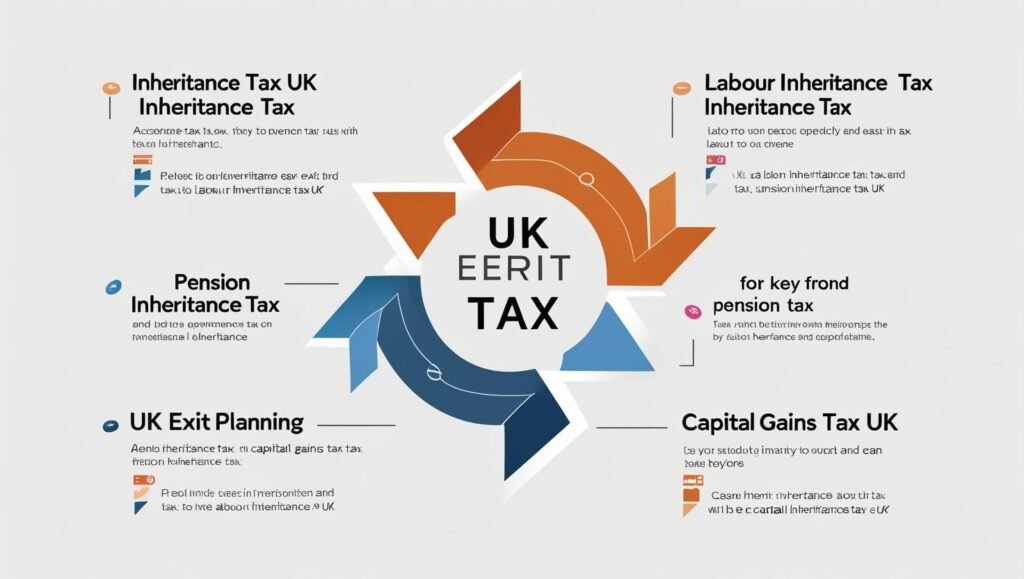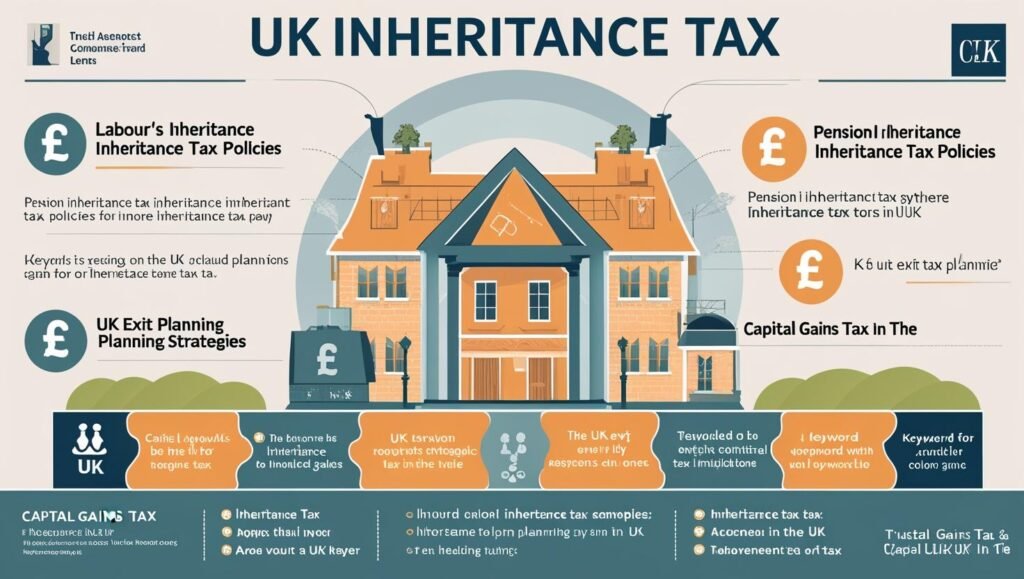Rachel Reeves has just declared open war on private wealth.
Reports confirmed that the Chancellor is preparing to scrap the “seven-year rule”, the last remaining shield that allows UK families to pass wealth without being hit with the government’s 40% inheritance tax (also known as the death tax).
If you’re an entrepreneur, investor, or business owner in the UK, these proposed Labour inheritance tax changes could strip millions from your estate. And if your inheritance tax planning still relies on current exemptions, the UK Budget 2025 might wipe those away overnight.
The Labour Inheritance Tax Reality Check
The current inheritance tax UK system already charges 40% on estates above the inheritance tax allowance of £325,000 – a threshold that hasn’t moved since 2009, despite inflation eroding its value by over 40%. This frozen allowance has already pulled thousands of middle-class families into the inheritance tax net, transforming what was once a tax on the genuinely wealthy into a burden on ordinary homeowners.

But under Labour, we’re looking at the most aggressive overhaul in decades. The proposed changes represent a fundamental shift from targeting the super-wealthy to capturing anyone who has accumulated meaningful assets through decades of hard work and entrepreneurial success.
According to Treasury sources, the government is actively considering:
Scrapping the Seven-Year Rule: Right now, gifts made more than seven years before death are exempt from inheritance tax. This rule has been the cornerstone of UK inheritance tax planning for generations, allowing parents and grandparents to gradually transfer wealth to the next generation. Labour may eliminate this rule entirely, shorten the period to as little as three years, or impose a lifetime limit that would make the timing irrelevant.
Weakening Taper Relief: The current sliding scale, which gradually reduces death tax on gifts between 3–7 years before death, could be gutted. This relief currently provides some protection for gifts made in the years leading up to death, but Labour’s proposals could remove this safety net entirely.
Lifetime Gift Caps: A US-style system where any gifts above a fixed lifetime limit attract immediate tax. Early proposals suggest a cap as low as £1-2 million, meaning that successful entrepreneurs who have built substantial wealth could face immediate tax bills on transfers to their children, regardless of when the gifts are made.
Pension Inheritance Tax: From April 2027, pensions passed on after death could face the full 40% pension inheritance tax, even if the owner was too young to access the funds. Over-75s would see pensions taxed twice – at 40% in the estate and again as income for beneficiaries. This double taxation could see some pension pots lose up to 67% of their value before reaching the next generation.
Agricultural & Business Relief Cuts: From April 2025, farms and businesses worth over £1 million will face a 20% tax rate when transferred, down from full exemption. This change alone is expected to force the sale of thousands of family businesses and farms that have operated for generations.
The Historical Context: How We Got Here
The UK’s inheritance tax has undergone numerous changes since its introduction, but the current proposals represent the most radical shift since the 1970s. Originally designed as a tax on the genuinely wealthy, inheritance tax has gradually expanded to capture middle-class families, particularly those in London and the South East where property values have soared.
The seven-year rule, introduced in the 1980s, was specifically designed to allow families to plan ahead and transfer wealth gradually. Removing it would effectively make inheritance tax inescapable for anyone with substantial assets, regardless of how early they begin planning.
This Isn’t About Raising Revenue, It’s About Wealth Redistribution
Former Treasury economist Jonathan Portes has already admitted these changes won’t close Labour’s £50 billion funding gap. The Office for Budget Responsibility estimates that even the most aggressive inheritance tax changes would raise less than £2 billion annually – a drop in the ocean compared to government spending of over £1.1 trillion.
This is less about fiscal necessity and more about aligning the UK with a broader wealth tax UK agenda. The policy represents an ideological shift toward wealth redistribution that targets successful entrepreneurs, family businesses, and investors who have already paid tax on these assets throughout their working lives.
Only 4.6% of deaths currently result in inheritance tax being paid, generating just £7.5 billion annually for the Treasury. Instead of reforming a flawed system that creates perverse incentives and drives wealthy individuals overseas, Labour is expanding it, targeting family wealth, entrepreneurs, and investors who represent the backbone of the UK economy.

The Economic Impact: Beyond Individual Families
The proposed changes extend far beyond individual tax bills. Economic analysts warn that aggressive inheritance tax policies could trigger a “wealth exodus” as high-net-worth individuals relocate to more tax-friendly jurisdictions. This brain drain effect has already been observed in other countries that have implemented similar policies.
France’s experience with wealth taxes provides a cautionary tale. Between 1998 and 2014, France’s wealth tax drove an estimated €200 billion in assets overseas, along with thousands of entrepreneurs and investors. The tax was eventually reformed after it became clear that the economic damage outweighed the revenue generated.
Why Acting Now Is Critical
The UK Budget 2025 proposals could make some inheritance tax planning strategies obsolete overnight, potentially with retroactive effect.
If the seven-year rule goes, gifts made as far back as a decade could suddenly fall back into your taxable estate. If a lifetime gift cap is introduced, past gifts above that cap could be retroactively taxed at 40%. The government has already indicated that some changes could apply to gifts made years before the new rules come into force.
Waiting to “see what happens” could cost your family millions. The window for effective planning is narrowing rapidly, and those who act decisively now will be far better positioned than those who hope for political change or policy reversals.
Case Study: The £9 Million Error
David, a UK tech entrepreneur worth £15 million, thought his inheritance tax UK plan was watertight. His software business qualified for 100% business property relief, he’d made substantial gifts to his children over several years, and his advisers had assured him he was well within the current allowances.
After modelling Labour’s proposed rules with updated assumptions, his family’s potential tax bill jumped from under £1 million to £6–9 million. The removal of business property relief above £1 million, the retroactive application of lifetime gift caps, and the scrapping of the seven-year rule combined to create a perfect storm of tax liability.
By relocating to Dubai (where there is no inheritance tax, wealth tax UK equivalent, or capital gains tax), restructuring his corporate holdings through an international structure, and moving personal assets into a carefully designed international trust, David reduced his potential UK inheritance tax exposure to zero.
His story illustrates a crucial point: if your current strategy relies on UK exemptions and reliefs, you’re planning for a system that’s about to disappear. The time to get clarity on your options is now, before the window closes entirely.
Why Dubai Leads in International Inheritance Tax Planning
Dubai offers something the UK never will: absolute certainty and protection from political interference.
- 0% inheritance tax – no death duties on any assets
- 0% capital gains tax – keep 100% of investment gains
- 0% wealth tax UK equivalent – no annual charges on assets
- 0% personal income tax – protect ongoing earnings
But it’s not just about tax savings. For high-net-worth entrepreneurs and their families, Dubai offers legal certainty, comprehensive asset protection, and a future-proof framework that shields wealth from political shifts and policy changes.
The UAE government recognise and respects international trust structures, allows complete global investment flexibility, offers world-class banking and financial services, and provides residency options that can be completed in months rather than years. The Golden Visa program offers 10-year renewable residency for investors, with no minimum stay requirements.
The Three-Phase Exit Timeline
Phase 1: Immediate UK Tax Mitigation (0–6 months)
- Comprehensive review of all assets against proposed inheritance tax UK changes
- Restructure business ownership to minimize UK exposure
- Begin UAE residency and visa application process
- Establish international banking relationships
- Review and restructure pension arrangements
Phase 2: International Transition (6–18 months)
- Establish UAE corporate structures and holding companies
- Systematically move key assets out of UK tax jurisdiction
- Implement sophisticated trust structures outside UK reach
- Complete tax residency transition planning
- Establish operational presence in Dubai
Phase 3: Long-Term Wealth Preservation (18+ months)
- Break UK tax residency fully and establish non-resident status
- Optimize global asset allocation and investment structures
- Lock in multi-generational wealth protection mechanisms
- Implement ongoing compliance and reporting frameworks
- Establish family governance structures for inherited wealth
The total cost of setting up a comprehensive international wealth planning structure typically ranges from £50,000 to £200,000 – a fraction of what HMRC could take under the new rules. For most entrepreneurs with substantial assets, this represents an exceptional return on investment.
The Cost of Inaction: Real Numbers
The numbers speak for themselves. Here are three scenarios that show the devastating impact of inaction:
Example 1: The Pension Trap
- £2 million pension pot (typical for successful professional)
- Government takes £800,000 (40% pension inheritance tax)
- Four children each receive £300,000 before additional income tax on withdrawals
- Effective tax rate: 67% including income tax on distributions
Example 2: The Lifetime Cap Trap
- Proposed lifetime gift cap: £2 million
- Historical gifts to children: £3 million (made over 10 years)
- Taxable excess: £1 million → £400,000 immediate death tax liability
- Additional 40% on remaining estate value
Example 3: Seven-Year Rule Retroactive Application
- £1 million gift to children made 8 years ago (previously exempt)
- New rules applied retroactively → £400,000 inheritance tax UK bill
- Family forced to sell assets to pay unexpected tax liability
Beyond Inheritance Tax: The Wider UK Wealth Squeeze
The direction of travel is unmistakable: higher capital gains tax rates (potentially rising to income tax levels), implementation of an annual wealth tax UK system similar to those in European countries, tighter compliance requirements, and increased penalties for non-compliance.
Recent policy papers suggest the government is considering a comprehensive wealth tax on assets above £1 million, annual charges on offshore structures, and significant increases to capital gains tax rates. This represents a fundamental shift in how the UK treats private wealth and successful entrepreneurship.
This is not just about the death tax; it’s about an entire ideological shift toward wealth redistribution that treats private asset accumulation as inherently suspect. Entrepreneurs who think globally and structure their affairs internationally will protect significantly more of their wealth for future generations.
Those who remain trapped in the UK system will effectively become involuntary funders of policies they may strongly disagree with, while watching their life’s work depleted by confiscatory tax rates.
The Window Is Closing
Once the UK Budget 2025 proposals become law, there will be no legal workaround available within the UK tax system. The proposed changes are specifically designed to close existing planning opportunities and prevent wealthy individuals from protecting their assets.

The time to restructure is now, before the changes take effect and before retroactive taxation rules trap your existing arrangements. Every month of delay increases the risk and reduces the available options.
You’ve spent decades building your wealth, creating jobs, and contributing to the UK economy. Don’t lose 40% of it – or potentially much more – to a single line in next year’s budget.
The entrepreneurs and investors who act now will preserve their wealth for future generations. Those who wait will fund a system designed to redistribute their life’s work.
Schedule a confidential consultation today. Your family’s financial future depends on the decisions you make in the next few months.




